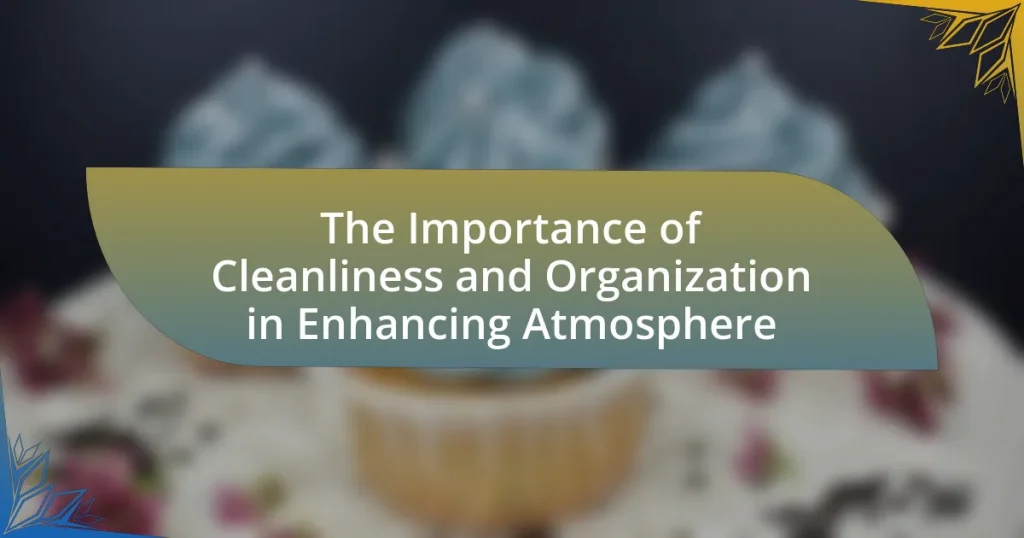The article focuses on the significance of cleanliness and organization in enhancing atmosphere across various environments, including workplaces, homes, and public spaces. It highlights how a clean and organized setting contributes to mental well-being, reduces stress, and improves productivity, supported by research from the Journal of Environmental Psychology. The article further explores the psychological effects of cleanliness on individuals, its influence on social interactions, and the benefits of maintaining organized spaces. Additionally, it provides practical strategies for sustaining cleanliness and organization, emphasizing their role in promoting health, safety, and overall satisfaction in different settings.

What is the Importance of Cleanliness and Organization in Enhancing Atmosphere?
Cleanliness and organization are crucial for enhancing atmosphere as they create a sense of order and tranquility. A clean environment reduces stress and promotes mental clarity, which has been supported by studies indicating that clutter can negatively impact focus and productivity. For instance, research published in the Journal of Environmental Psychology shows that organized spaces lead to improved cognitive function and emotional well-being. Furthermore, cleanliness fosters a positive impression, influencing social interactions and overall satisfaction in various settings, such as workplaces and homes.
How does cleanliness contribute to a positive atmosphere?
Cleanliness significantly contributes to a positive atmosphere by promoting mental well-being and enhancing productivity. A clean environment reduces stress and anxiety, as studies show that clutter and dirt can lead to feelings of overwhelm and distraction. For instance, research published in the Journal of Environmental Psychology indicates that individuals in clean spaces report higher levels of focus and satisfaction. Furthermore, cleanliness fosters a sense of respect and care within a community, encouraging positive interactions among individuals. This is supported by findings from the American Psychological Association, which highlight that organized and clean settings can improve social behavior and cooperation.
What psychological effects does cleanliness have on individuals?
Cleanliness positively affects individuals by enhancing their mental well-being and reducing stress. Research indicates that a clean environment can lead to improved focus, increased productivity, and a greater sense of control. For instance, a study published in the Journal of Environmental Psychology found that individuals in clean spaces reported lower levels of anxiety and higher levels of satisfaction compared to those in cluttered environments. This correlation suggests that cleanliness not only fosters a sense of order but also contributes to emotional stability and overall psychological health.
How does cleanliness influence social interactions?
Cleanliness significantly influences social interactions by affecting perceptions of individuals and environments. A clean environment fosters positive impressions, enhances comfort, and encourages social engagement, as studies indicate that people are more likely to interact in tidy spaces. For instance, research published in the Journal of Environmental Psychology shows that individuals perceive clean settings as more welcoming and are more inclined to initiate conversations and form connections. This correlation between cleanliness and social behavior underscores the importance of maintaining organized and hygienic spaces to facilitate effective communication and relationship-building.
In what ways does organization impact the atmosphere?
Organization significantly impacts the atmosphere by creating a sense of order and reducing stress. A well-organized environment promotes efficiency and clarity, which can enhance productivity and overall well-being. Studies have shown that cluttered spaces can lead to increased anxiety and decreased focus, while organized spaces foster a calm and inviting atmosphere. For instance, research published in the Journal of Environmental Psychology indicates that individuals in organized environments report higher levels of satisfaction and lower stress levels compared to those in disorganized settings. This demonstrates that organization not only influences individual mood but also contributes to a more positive communal atmosphere.
What are the benefits of an organized environment?
An organized environment enhances productivity and reduces stress. Studies indicate that individuals in organized spaces experience a 20% increase in productivity due to decreased distractions and improved focus. Furthermore, a tidy environment contributes to mental clarity, as clutter can lead to feelings of overwhelm and anxiety. Research from the Princeton University Neuroscience Institute shows that physical clutter competes for your attention, making it harder to focus on tasks. Thus, maintaining an organized environment not only boosts efficiency but also promotes a healthier mental state.
How does organization affect productivity and focus?
Organization significantly enhances productivity and focus by creating a structured environment that minimizes distractions and streamlines tasks. A well-organized workspace allows individuals to locate necessary materials quickly, reducing time wasted on searching for items and enabling a more efficient workflow. Research indicates that cluttered environments can lead to increased stress and decreased cognitive function, as demonstrated in a study published in the Journal of Environmental Psychology, which found that individuals in organized spaces reported higher levels of focus and lower levels of anxiety. Therefore, maintaining organization directly correlates with improved productivity and enhanced concentration.

Why is Cleanliness Essential in Various Settings?
Cleanliness is essential in various settings because it promotes health, safety, and well-being. In healthcare environments, for instance, maintaining cleanliness reduces the risk of infections; studies show that proper sanitation can decrease hospital-acquired infections by up to 30%. In educational institutions, a clean environment enhances focus and learning, as clutter and dirt can distract students and negatively impact their performance. Additionally, in workplaces, cleanliness fosters productivity and morale; research indicates that employees are more motivated and efficient in clean spaces. Overall, cleanliness is a fundamental aspect that significantly influences health outcomes, learning effectiveness, and workplace efficiency across different settings.
What role does cleanliness play in workplaces?
Cleanliness in workplaces is crucial for promoting employee health, productivity, and morale. A clean environment reduces the spread of germs and illnesses, which can lead to fewer sick days and lower healthcare costs for employers. According to a study published in the Journal of Occupational and Environmental Medicine, workplaces that maintain high cleanliness standards report a 20% increase in employee productivity. Furthermore, a tidy workspace enhances focus and reduces distractions, contributing to a more efficient work atmosphere. Cleanliness also positively impacts employee morale, as a well-maintained environment fosters a sense of pride and professionalism among staff.
How does a clean workplace affect employee morale?
A clean workplace significantly boosts employee morale by creating a positive and productive environment. Research indicates that employees in clean settings report higher job satisfaction and lower stress levels. For instance, a study published in the Journal of Environmental Psychology found that cleanliness directly correlates with increased employee motivation and engagement. This is because a tidy workspace reduces distractions and fosters a sense of pride and ownership among employees, leading to improved overall performance.
What are the health implications of cleanliness in the workplace?
Cleanliness in the workplace significantly impacts employee health by reducing the spread of infectious diseases and promoting mental well-being. A clean environment minimizes the presence of pathogens, allergens, and irritants, which can lead to fewer sick days and lower healthcare costs. For instance, a study published in the Journal of Occupational and Environmental Medicine found that improved workplace cleanliness can decrease absenteeism by up to 20%. Additionally, a tidy workspace contributes to reduced stress levels and increased productivity, as employees are less distracted by clutter and more focused on their tasks.
How does cleanliness enhance the atmosphere in public spaces?
Cleanliness significantly enhances the atmosphere in public spaces by promoting a sense of safety and well-being among visitors. When public areas are clean, they encourage higher foot traffic, as people are more likely to spend time in environments that are visually appealing and free from litter. Research conducted by the University of California found that clean public spaces can lead to a 20% increase in the time individuals spend in those areas, which in turn boosts local businesses and community engagement. Additionally, cleanliness reduces the spread of germs and diseases, contributing to public health, which further enhances the overall atmosphere by fostering a sense of security and comfort among users.
What impact does cleanliness have on community perception?
Cleanliness significantly enhances community perception by fostering a sense of pride and safety among residents. When public spaces are clean, community members are more likely to feel a connection to their environment, which can lead to increased civic engagement and participation in local activities. Research indicates that well-maintained areas can reduce crime rates; for instance, a study published in the Journal of Environmental Psychology found that neighborhoods perceived as clean are often associated with lower levels of vandalism and littering. This correlation underscores the importance of cleanliness in shaping positive community attitudes and behaviors.
How does cleanliness in public spaces affect visitor experiences?
Cleanliness in public spaces significantly enhances visitor experiences by promoting comfort and satisfaction. Research indicates that clean environments lead to positive emotional responses, which can increase the likelihood of repeat visits. For instance, a study published in the Journal of Environmental Psychology found that individuals are more likely to enjoy their time in well-maintained areas, associating cleanliness with safety and care. Additionally, cleanliness reduces the perception of risk, as visitors feel more secure in hygienic surroundings, further contributing to an overall positive experience.

What Strategies Can Enhance Cleanliness and Organization?
Implementing a systematic cleaning schedule is a key strategy to enhance cleanliness and organization. Regularly scheduled cleaning tasks, such as daily tidying, weekly deep cleaning, and monthly decluttering, ensure that spaces remain orderly and hygienic. Research indicates that environments maintained through consistent cleaning practices can significantly reduce stress and improve productivity, as shown in a study by the Princeton University Neuroscience Institute, which found that clutter can negatively impact focus and task completion. Additionally, utilizing organizational tools like storage bins, labels, and checklists can further streamline the process, making it easier to maintain a clean and organized environment.
What are effective cleaning practices for maintaining cleanliness?
Effective cleaning practices for maintaining cleanliness include regular dusting, vacuuming, and sanitizing surfaces. These practices help eliminate dirt, allergens, and germs, contributing to a healthier environment. For instance, studies show that regular cleaning can reduce the presence of allergens by up to 50%, significantly improving indoor air quality. Additionally, using appropriate cleaning agents, such as disinfectants that meet EPA standards, ensures that harmful pathogens are effectively removed. Implementing a cleaning schedule can also promote consistency, making it easier to maintain a clean and organized space.
How can regular cleaning schedules improve overall hygiene?
Regular cleaning schedules significantly enhance overall hygiene by systematically removing dirt, bacteria, and allergens from surfaces. This consistent maintenance reduces the risk of illness, as studies indicate that regular cleaning can lower the presence of pathogens by up to 80%. Furthermore, a clean environment promotes better air quality, which is essential for respiratory health. By adhering to a cleaning schedule, facilities can ensure that high-touch areas are disinfected frequently, thereby minimizing the spread of infectious diseases.
What tools and products are essential for effective cleaning?
Essential tools and products for effective cleaning include microfiber cloths, mops, vacuum cleaners, disinfectants, and scrub brushes. Microfiber cloths trap dirt and dust effectively, while mops are crucial for maintaining floor cleanliness. Vacuum cleaners remove debris from carpets and upholstery, enhancing indoor air quality. Disinfectants kill germs and bacteria, ensuring a hygienic environment. Scrub brushes assist in tackling tough stains and grime on various surfaces. These tools and products collectively contribute to a cleaner and more organized atmosphere, which is vital for enhancing overall well-being and productivity.
How can individuals and organizations improve organization?
Individuals and organizations can improve organization by implementing systematic processes and utilizing organizational tools. For instance, adopting project management software can streamline tasks and enhance collaboration, leading to increased efficiency. Research indicates that organizations using such tools report a 20% increase in productivity (Source: Project Management Institute, 2021). Additionally, establishing clear communication channels and regular check-ins fosters accountability and ensures that everyone is aligned with organizational goals. By prioritizing these strategies, both individuals and organizations can create a more structured and effective environment.
What techniques can be used for effective space organization?
Effective space organization techniques include decluttering, utilizing vertical space, and implementing storage solutions. Decluttering involves removing unnecessary items to create a more open and functional environment, which has been shown to reduce stress and improve focus. Utilizing vertical space, such as shelves and wall-mounted storage, maximizes the use of available area, making it easier to access items while keeping the floor clear. Implementing storage solutions, like bins and drawer organizers, helps categorize and store items efficiently, leading to a more organized and aesthetically pleasing space. These techniques collectively enhance the atmosphere by promoting cleanliness and order.
How can digital tools assist in maintaining organization?
Digital tools assist in maintaining organization by providing efficient systems for task management, scheduling, and information storage. These tools, such as project management software and digital calendars, streamline workflows by allowing users to prioritize tasks, set deadlines, and collaborate in real-time. For instance, a study by McKinsey found that productivity can increase by 20-25% in organizations that use digital collaboration tools effectively. This demonstrates that digital tools not only enhance individual organization but also improve overall team efficiency and communication, contributing to a cleaner and more organized atmosphere.
What are practical tips for sustaining cleanliness and organization?
To sustain cleanliness and organization, implement a daily cleaning routine that includes decluttering, surface wiping, and organizing items in designated spaces. Establishing a consistent schedule, such as dedicating 10-15 minutes each day for tidying up, helps maintain order and prevents buildup of mess. Research indicates that environments that are clean and organized can enhance productivity and reduce stress levels, as shown in a study published in the Journal of Environmental Psychology, which found that cluttered spaces can lead to feelings of anxiety and distraction. Additionally, utilizing storage solutions like bins and labels can further promote organization, making it easier to locate items and maintain a tidy environment.















